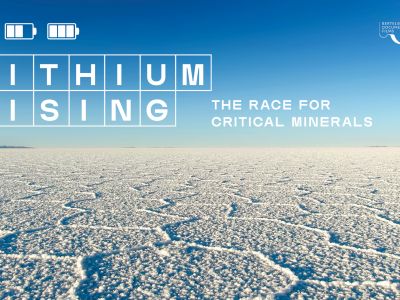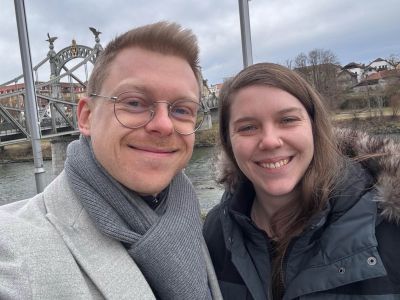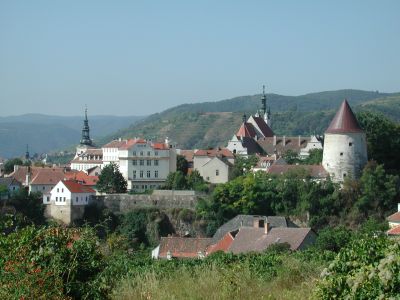News & Events
First Two-Day High-Performance Trip

Photo: The group at Rosenbauer (Austrian Marshall Plan Foundation/ Dr. Peter G. Weixelbaumer)
The Foundation organized the first two-day High-Performance Trip with a 13-member high-potential student group to Upper Austria on September 28-29, 2023. The students came to Upper Austria to exchange ideas and to network. Leading international companies opened their doors, and representatives of the board and management engaged in open discussions. In this context, high performance does not mean output or productivity alone, but above all innovative strength, sustainability, technical excellence, exemplary performance, and a sense of responsibility.
The trip started with the participants getting to know each other over lunch, which was sponsored by WKÖ Upper Austria. Mr. Zepetzauer attended the lunch as a representative and wished the participants much success and exciting experiences for the next two days.
The group's first stop was an industrial company that combines history and the future, consistency, and willingness to change, regionality and internationality, manpower and technology in an exemplary manner: the Miba Group in Laakirchen.
"Thinking out of the box" became the guiding principle of the first afternoon at Miba. After an overview of the Group by Miba Human Resources Director Bernhard Reisner, Design Thinking Process Specialist Vitor Morgado and Valerie Weixlbaumer- Pekari from the Miba management board led through a design-thinking workshop. After all, the challenges of today and tomorrow need alternative innovation and problem-solving processes. Within three hours, the student group developed rough technical and communication approaches for alternative wind energy applications.
During the informal exchange of experiences with Christian Hansl, General Manager of Miba Sinter Group, the delegation reflected on training, management, and leadership topics in multidisciplinary teams. Overall, the first program day provided important impulses – from effective innovation processes to acting in ecosystems.
The second day of the program focused on challenges for the construction machinery industry, which is also undergoing major changes: digitalization, "Internet of machines," zero emissions, sustainable construction, material and process efficiency. At the same time, capacity bottlenecks have to be overcome.
Wacker Neuson of Linz, a major development and production facility for construction equipment, was on the agenda for the second day. Managing Director Stefan Bogner outlined the development and portfolio of the production site, which as the largest plant in the international Wacker Neuson Group also handles production for the John Deere brand. During the subsequent tour, the delegation learned about the individual process steps and product diversity of Wacker Neuson Linz.
Finally, the students were able to experience for themselves how Wacker Neuson products combine design, functionality, safety and comfort to the highest degree during a test excavation at the site.
The tenor of the visit was that the construction industry is undergoing a major transformation. And Wacker Neuson Linz, as the industry leader, is actively driving it forward.
In management, we like to talk about the "window of opportunity:" a period of time in which a step can be successfully taken, before or after which it is difficult or impossible to implement.
One company that brings this view to the moment is the Rosenbauer Group. The company develops, produces, and provides firefighting products and services that have to function on the spot when needed. Or, again, in the dimension of a time span: Whether a fire causes comparatively little damage is decided within a few minutes. If the alarm and firefighting chain fails, the fire may still be defeated, but with enormous damage.
In addition, global firefighting is also a powerful lever for climate protection. After all, forest fires and wildfires are responsible for about 15% of global CO2 emissions. Thus, one of the questions that was intensively discussed among the group was why global policy does not focus more strongly on prevention, systems and legal frameworks.
Rosenbauer CEO Sebastian Wolf, CSO Andreas Zeller, Executive Board Assistant Lelio Spannocchi, and Sales Specialist Steve John led a tour of the headquarters of the globally active group for fire and disaster protection. In a workshop, they worked together with the group of students on specific market issues that can only be solved with new thinking, innovative strength and sustainability. Parameters such as premium quality, functionality, maximum individualization, design and cost-effectiveness flow into one another - fascinating and challenging at the same time.
The visit to Rosenbauer was concluded with a joint lunch and a tour of several vehicle models, such as the Panther or the e-vehicle production.
All in all, the two days and the three company visits were a good opportunity for both the Fellows and the companies to learn where the respective entrepreneurial as well as scientific focus lies. Furthermore, the trip showed very well what potential there is with regard to transatlantic relations, both in the entrepreneurial area and among researchers. Austria does not have to hide from the USA in these areas.
Finally, we would like to express our sincere thanks to the supporters, without whom this trip would not have been possible in this form: the State of Upper Austria, the IV Upper Austria and the WKO Upper Austria.

Photo: The group at Miba (Austrian Marshall Plan Foundation/ Dr. Peter G. Weixelbaumer)

Photo: The group at Wacker Neuson (Austrian Marshall Plan Foundation/ Dr. Peter G. Weixelbaumer)


